This is from the February 7, 2007 program of CNBC’s Morning Call.
CNBC On Why DRM Should Go Away (Quicktime – 16 MB)
CNBC On Why DRM Should Go Away (MP3 – 8 MB)

This story was inspired by Steve Jobs’ recent
campaign to kill Digital Rights Management (DRM) in iTunes.
The argument supporting this position was best described when the commentator started off saying:
“Mr. Sherman, your anti-piracy software doesn’t work anyway. What’s the point?”
Long story short:
-DRM is only a hassle for consumers. Real “pirates” hack it anyway.
-DRM doesn’t need to exist for new business models – there are numerous subscription services already without DRM.
-For this reason, a subscription service that doesn’t let you move your music around between your different devices is already “broken” (while also depriving you of your fair use and first sale rights to make legal copies of media you’ve purchased legally).
Category Archives: Fair Use Copy Prevention
Salon: The Same Old File Format Trouble With The New ‘Legal’ Online Music Services
Andrew Leonard makes some relevant statements about what’s wrong with all the different “legal” music services developing, and how, by not embracing the universal MP3 format that made Napster so damn great, they all kind of suck.
Musical snares
Is Apple’s iTunes service nirvana for music fans — or just the start of a file-format nightmare that will drive us all nuts?
By Andrew Leonard for Salon.
The quality of my life has improved. But iTunes for Windows is not perfect, and my music consumer utopia is still an unrealized dream. Despite its vaunted half a million songs, I want plenty of albums and acts that are not yet available. I am greedy. I want everything. Let me buy it now. I’m also not crazy about the iTunes library organizing software. But what alarms me the most is the flip side of Apple’s success — a looming battle over file formats that, at least in the short term, is going to force consumers to make hard choices.
Because iTunes won’t play my Windows Media music files. And the Windows Media Player won’t play songs purchased from the iTunes store.
That’s not the future I want to pay for. In the 21st century era of late capitalism, the consumer is supposed to be king — my every desire is supposed to be reflected by marketplace offerings. Instead, the market is ordering me to get Steve Jobs’ smirking grin tattooed on my butt, and while that may be an improvement on being branded with a Microsoft iron, I’d still rather keep my skin as it started, unblemished.
Right now, there are several options for compressing music files into sizes where it becomes feasible to download them online. Tunes purchased from the iTunes Music Store come in the AAC format. Tunes bought from most other commercial services have aligned themselves with Microsoft’s WMA format. Then there’s the original MP3 standard, which is aligned with no single company, and there’s even a free software alternative called Ogg Vorbis.
This is not the place to engage in a detailed discussion of the relative merits of the different formats. Suffice it to say that about a year ago I committed an egregious error. When I finally purchased my first computer with a CD burner, I was so excited about being able to make my own CD mixes that I unthinkingly went ahead and used the Windows Media Player to rip all my favorite CDs to my hard drive. The Windows Media Player allows users to encode their songs only in the WMA format, which (like iTunes’ AAC format) comes with various digital rights management capabilities built in.
Now I have all this music that iTunes won’t play, and a bunch of songs purchased from iTunes that the Media Player won’t play. So, at the moment, I am prevented from burning a CD that has songs from both libraries. There are converters available that will transform WMA files into AACs and eventually there will no doubt be converters that perform the reverse service, but the process is a hassle that may end up downgrading the overall sound quality. I would have been far better off if I had ripped all my CDs to MP3s to begin with, because iTunes and the iPod will play MP3s. (And even, better, the iTunes software will allow me to rip my CDs into MP3s.)
I should have known better, because now I’m sitting exactly where Microsoft wants me, facing a significant “switching cost” if I want to adopt iTunes as my music-management software of choice. It takes time to rip CDs — and I have a lot of ’em…
I have a friend who has about 30,000 songs on a hard drive. There’s nothing to stop me from hooking his computer to mine with a USB cable and slurping all that music at once. Sure it’s illegal, and I’m not going to do it, but the RIAA would never know if I did, unless I did something stupid and put that server online for everybody on the Net to grab.
All over the world, even as Hollywood tries to push copy-protection legislation and sue individual file traders, music lovers are accumulating larger and larger collections of songs on their hard drives. Eventually, we’ll be able to go to our local flea market, and the guy who right now is selling freshly burned copies of Eminem is going to be selling us DVDs with 4.8 gigabytes of music, also for a few bucks. Even worse, the swap meets will soon be featuring swappable drives that will contain everything the Beatles ever recorded, or all the pop music from the ’60s, or the entire Warner Bros. catalog. Cheap.
I don’t know how the record companies are going to stop it. I do know that if one day I’m staring at hundreds of gigabytes of music files on my own computer that I paid for that aren’t playable on the newest piece of hardware or best available piece of music software, I’m going to be sorely tempted to head down to the flea market. And even if I refrain, that doesn’t mean everybody else will.
Wouldn’t it just be better to give me what I want, right now? Please don’t make the consumer angry! Or he’ll bite.
Ed Felten Explains How Black Boxes Interfere With Effective Public Policy
A number of distinguished organizations sponsored the Law and Technology of DRM conference that took place February 27 – March 1, 2003.
This presentation by Ed Felten is a real mind blower. The public is expected to tolerate the use of black box technologies in situations where doing so cannot possibly be in our best interest to do so, such as electronic voting machine systems.
The stills below explain a bit about this, but you’ll really want to listen to the whole thing for yourself. Please do. It’s really important that we all start taking this stuff very seriously so that we can start making our representatives aware of the current intolerable situation.
Ed Felten – Part 1 of 2 (Small – 10 MB)
Ed Felten – Part 2 of 2 (Small – 8 MB)
Ed Felten – Complete (Small – 17 MB)
Ed Felten – Complete (Hi-Res – 226 MB)
Audio – Ed Felten – Complete (MP3 – 12 MB)
Here’s a transcript.
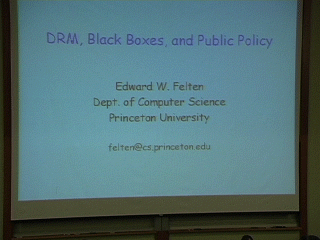

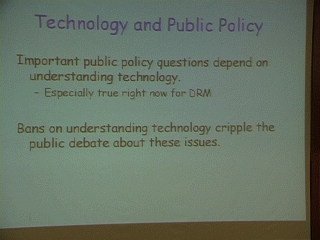
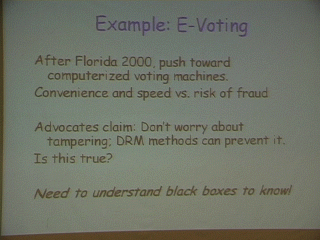
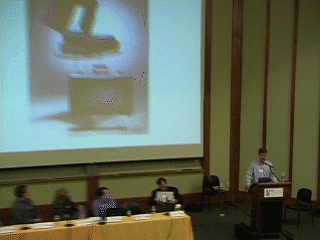
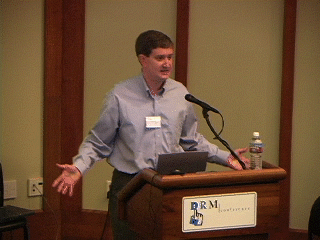
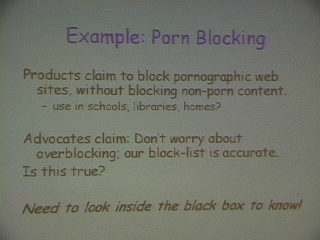
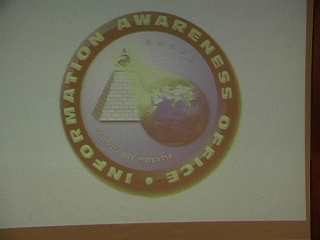
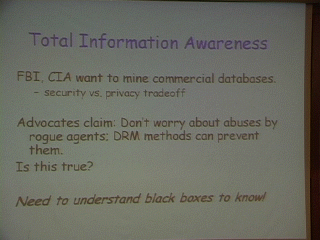

This work is dedicated to the
Public Domain. (Take it and run, baby!)
Barlow’s Case Against DRM
Fair use under assault
EFF co-founder John Perry Barlow argues the case against DRM
By Steve Gillmor for InfoWorld.
InfoWorld: What is the message that you feel needs to be made about DRM?
Barlow: I think that anybody who cares about the future of technology —
anybody who cares about the future, period — ought to be awfully
concerned about this. But people who work in technology have been
agnostic on the subject so far. They need to recognize that they’re
going to be faced with a fairly stark choice, which is a gradual
concentration around certain trusted platforms that cannot be broken
out of and are filled with black boxes that you can’t code around and
can’t see the inside of.
You have to get politically active and stop it from happening, because
Congress has been bought by the content industry. The choice is being
made at a very complex and subterranean political level. It’s being
done in standard settings, with the FCC, in amendments to obscure bills
in Congress, in the closed door sessions to set the Digital Broadcast
Standard. It has very significant long-term effects [for] the technical
architecture of cyberspace, because what we’re talking about embedding
into everything is a control and surveillance mechanism for the purpose
of observing copyright piracy, but [it] can be used for anything…
InfoWorld: You obviously feel strongly as an artist about the need to
protect fair use of content.
Barlow: We can’t be creative without having access to other creative
work. [If] I have to make sure that the rights are cleared every time I
download something or somebody wants me to hear something, it’s going
to cut way back on what I hear, which is going to cut way back on my
capacity to create. Imagine what it would be like to write a song if
you’d never heard one. Fair use is essential. But it is under assault.
Cringely to the Music Industry: Adapt Or Die
Resistance is Futile
How Peer-to-Peer File Sharing Is Likely to Change Big Media
By Robert X. Cringely for PBS.
Maybe you saw the story this week about a paper from Microsoft Research analyzing peer-to-peer file sharing networks with the conclusion that they can’t be stopped — not by the law, not by the movie studios and record companies, not even by mighty Microsoft and its Palladium initiative for trusted computing. Swapping songs and maybe movies is about to reach some critical mass beyond which it simply can’t be stopped, or so the kids in Redmond think…
Of course, the recording and publishing executives, who often work for the same parent company, aren’t going to go without a fight. We are approaching the end of the first stage of that fight, the stage where they try to have their enemy made illegal. But the folks at Microsoft Research now say quite definitively that legal action probably won’t be enough. That’s when we enter stage two, which begins with guerrilla tactics in which copyright owners use the very hacking techniques they rail against to hurt the peer-to-peer systems. This too shall pass when bad PR gets to the guerrillas. The trick to guerrilla or terrorist campaigns is to not care what people think, but in the end, Sony (just one example) cares what people think.
That’s when the record companies and publishers will appear to actually embrace peer-to-peer and try to make it their own.
This will be a ruse, of course, the next step in the death of a corrupt and abusive cultural monopoly. They’ll say they will do it for us. They’ll say they are building the best peer-to-peer system of all, only this one will cost money and it won’t even work that well. There is plenty of precedent for this behavior in other industries.
My favorite historical example of this phenomenon comes from the oil business. In the 1920s, the Anglo-Persian Oil Company had a monopoly on oil production in the Middle East, which they generally protected through the use of diplomatic — and occasionally military — force against the local monarchies. Then the Gulf Oil Company of Pittsburgh, Pennsylvania, literally sneaked into Kuwait and obtained from the Al-Sabah family (who still run the place) a license to search for oil.
The Anglo-Persian Oil Company did not like Gulf’s actions, but they were even more dismayed to learn that Gulf couldn’t be told to just go to hell. Andrew Mellon, of the Pittsburgh Mellons, was the U.S. Secretary of the Treasury, and he wasn’t about to let his oil company be pushed around by the British Foreign Office. So Anglo-Persian and the Foreign Office did their best to delay Gulf, which worked for several years. They lied a little, lost a few maps, failed to read a telegram or two, and when Gulf still didn’t go away, they turned to acting stupid. As the absolute regional experts on oil exploration, they offered to do Gulf’s job, to save the Americans the bother if searching for oil in Kuwait by searching for them.
The Anglo-Persian Oil Company searched for oil in Kuwait for 22 years without finding a single drop.
Remember that Kuwait is smaller than Rhode Island, and not only is it sitting atop more than 60 billion barrels of oil, it has places where oil has been known for more than 3,000 years to seep all the way to the surface. Yet Anglo-Persian was able to fulfill its contract with Gulf and keep two oil rigs continually drilling in Kuwait for 22 years without finding oil. To drill this many dry wells required intense concentration on the part of the British drillers. They had to not only be NOT looking for oil, they had to very actively be NOT LOOKING for oil, which is even harder.
Back to music and text publishing. Expect both industries to offer peer-to-peer systems that won’t work very well, and will cost us something instead of nothing. In the long run, though, these systems will probably die, too, at which point, the music and the print folks will have to find another way to make their livings. This will not be because of piracy, but because of the origination of material within the peer-to-peer culture, itself. We’re not that far from a time when artists and writers can distribute their own work and make a living doing so, which makes the current literary and music establishments a lot less necessary.
Forgive him, he knows not what he says…
In the “go stand in the corner and hit yourself until you understand what you did wrong” department, the producer of Star Wars decides to makes an ass of himself by comparing movie piracy to terrorism.
I wonder how much money he’ll make from P2P networks, once he stops trying to fight them and realizes what a potential cash cow they are.
(via BoingBoing)
More On Hollywood vs. Fair Use
Access Denied II
Hollywood wants to gain remote control over HDTV. Will it succeed?
By Stephen A. Booth
The content owners – read “Hollywood studios” – insist on stringent controls and are reluctant to let their most popular films be broadcast in high-definition without them. If the practice of making digital copies at home and then “sharing” them over the Internet caught on, the studios would stand to lose a lot of money on DVD and tape sales.
On the other side, consumer-electronics manufacturers and consumer advocates contend that these kinds of controls would deny viewers the right to make fair-use copies of legally purchased content. The U.S. Supreme Court established that right with the landmark 1984 decision that prevented the studios from blocking sales of Sony’s Betamax VCR. The court ruled that viewers can make video recordings of programs for personal use. Americans have become accustomed to time-shifting favorite TV programs, and we’re not likely to give up that right without a fight just because we’ve arrived in the digital age.
Dan Bricklin On How Copy Protection Robs The Future
Copy Protection Robs The Future
By Dan Bricklin.
I believe that copy protection will break the chain necessary to preserve creative works. It will make them readable for a limited period of time and not be able to be moved ahead as media deteriorates or technologies change. Only those works that are thought to be profitable at any given time will be preserved by their “owners” (if they are still in business). We know from history that what’s popular at any given time is no certain indication of what will be valuable in the future. Without not-copy protected “originals”, archivists, collectors, and preservers will be unable to maintain them the way they would if they weren’t protected. (Many of these preservers ignore fashion as they do their job, because they see their role as preservers not filters.) We won’t even be able to read media in obsolete formats, because the specifications of those formats will not be available. To create a “Rosetta Stone” of today’s new formats will be asking to go to jail and having your work banned.
Apple Stands Firm Against DRM?
Help us Apple. Your our only hope.
Dan Gillmor: Apple stands firm against entertainment cartel
Meanwhile, Apple is holding fairly fast to the real compromise position. It’s encouraging honor, but not locking us down in ways that prevent innovative uses of the gear it sells.
Maybe Apple will cave, too. If it does, it will betray customers and principle. So far, however, so good.
I really hope Dan’s right about Apple.
I just made the decision a few weeks ago to buy a Mac instead of a PC for my video editing system because I did not want to commit to the Windows DRM in XP that would then own all of my video files from now until eternity.
For me, choosing a Mac was like choosing freedom. (Don’t think I don’t know how silly that sounds.)
This was sure the first time I’ve ever felt that way about buying a PC or a Mac before. And it’s a pretty crummy feeling actually, realizing that we live in a world where we have to make privacy and security decisions like that while in the process of buying a video editing system.
Lawsuit Over Bon Jovi DRM
Universal Music Faces Lawsuit Over PIN on Bon Jovi Album
By Lingling Wei for the Wall St. Journal
At issue is a promotional program, called “American XS,” that was announced on Sept. 16 by Universal Music in connection with the Bounce release — scheduled for Oct. 8 in the U.S. The plan is based around a unique PIN code, or serial number, that will come with every album shipped.
The buyer of the CD can type in the number at the band’s Web site (www.bonjovi.com). Then, after providing personal information including age, gender and location, the owner will be registered as a member who will be regularly notified by e-mail of “Bon Jovi exclusives,” which may include the opportunity to chat with the band.
While Universal Music didn’t mention DownloadCard in its announcement of the “American XS” plan, DownloadCard contends the plan is “precisely the program created by DownloadCard … and offered to” Universal Music for the Bounce release. Universal Music, though, said in July it wouldn’t use the technology for the album release, according to DownloadCard’s court filing.